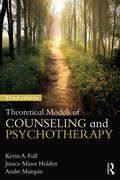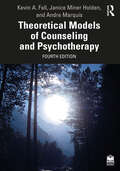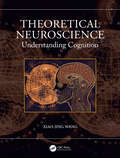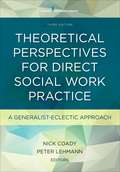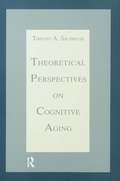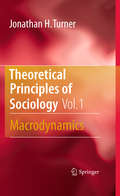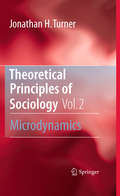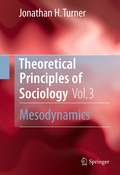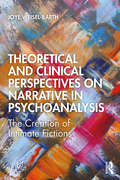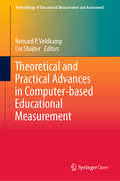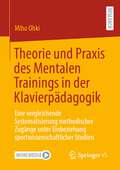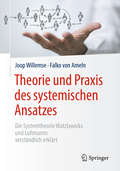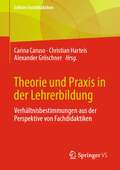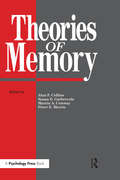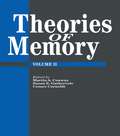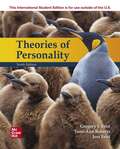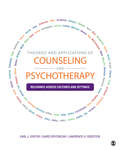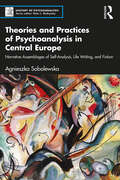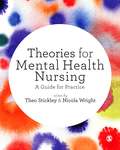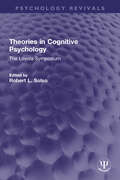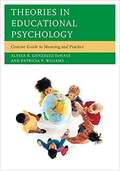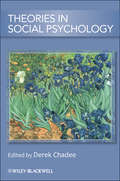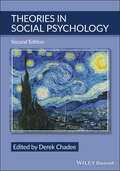- Table View
- List View
Theoretical Models of Counseling and Psychotherapy
by Kevin A. Fall Janice Miner Holden Andre MarquisThis text provides a comprehensive overview of a variety of major counseling theories and focuses on the integration of different theoretical models. Appropriate for advanced undergraduates and graduate students, it offers a detailed description of the philosophical basis for each theory, along with historical context and a biography of the founder. Each chapter follows a similar format and explores the main features of the theory, including its approach to and ideas on personality development, human nature, the role of environment, the change process in therapy, and contributions and limitations to the mental health field. Theory-specific information on diagnosis, psychopharmacology, multicultural issues, spirituality, and gender issues is also discussed. These features will provide students with a deeper and more complete understanding of counseling theory than is available in any single resource and allow them to easily bridge classroom study to their future practice. This second edition of the text has been completely updated and includes more case examples, as well as a new chapter on Constructivist approaches. An online instructor's manual with student resources is available and offers material to enhance the pedagogical features of the text.
Theoretical Models of Counseling and Psychotherapy
by Kevin A. Fall Janice Miner Holden Andre MarquisThe fourth edition of Theoretical Models of Counseling and Psychotherapy provides a comprehensive overview of a variety of major counseling theories and focuses on the integration of different theoretical models. With new information on multiculturalism and diversity, the book offers a detailed description of the philosophical basis for each theory as well as historical context and biographical information on each theory’s founder. Chapters include new case excerpts and clinical examples, and each chapter follows a consistent structure in its exploration of each theory’s features, including its approach to and ideas on personality development, human nature, the role of environment, the change process in therapy, and contributions to the mental health field. Theory-specific information on diagnosis, psychopharmacology, spirituality, and gender issues is also discussed, and there is an added emphasis on diversity and social justice issues. The book is accompanied by instructor and student resources where professors and students will find exercises and course material that will further deepen their understanding of counseling theory and allow them to easily bridge classroom study to future practice. Available for free download for each chapter: PowerPoint slides and a testbank of 25 multiple-choice questions.
Theoretical Neuroscience: Understanding Cognition
by Xiao-Jing WangThis textbook is an introduction to Systems and Theoretical/Computational Neuroscience, with a particular emphasis on cognition. It consists of three parts: Part I covers fundamental concepts and mathematical models in computational neuroscience, along with cutting-edge topics. Part II explores the building blocks of cognition, including working memory (how the brain maintains and manipulates information "online" without external input), decision making (how choices are made among multiple options under conditions of uncertainty and risk) and behavioral flexibility (how we direct attention and control actions). Part III is dedicated to frontier research, covering models of large-scale multi-regional brain systems, Computational Psychiatry and the interface with Artificial Intelligence. The author highlights the perspective of neural circuits as dynamical systems, and emphasizes a cross-level mechanistic understanding of the brain and mind, from genes and cell types to collective neural populations and behavior. Overall, this textbook provides an opportunity for readers to become well versed in this highly interdisciplinary field of the twenty-first century. Key Features Rooted in the most recent advances in experimental studies of basic cognitive functions Introduces neurobiological and mathematical concepts so that the book is self-contained Heavily illustrated with high-quality figures that help to illuminate neurobiological concepts, present experimental findings and explain mathematical models Concludes with a list of core cognitive behavior tasks, ten take-home messages and three open questions for future research Computer model codes are available via GitHub for hands-on practice
Theoretical Perspectives for Direct Social Work Practice: A Generalist-Eclectic Approach
by Nick Coady Peter Lehmann<p>This expanded third edition of a popular textbook provides a completely revised and updated overview of the theories, models, and therapies that inform direct social work practice. The text is grounded in generalist social work principles and values and promotes a problem-solving model of social work practice as a framework for the eclectic use of theory, as well as for integrating the artistic, reflective elements of practice. It provides in-depth coverage of select psychodynamic, cognitive-behavioral, humanistic, critical, and postmodern theories. <p>The third edition features a new section on Critical Theories, where a new chapter on Empowerment Theory is included with a completely revised chapter on Feminist Theory. A new chapter on Strengths-based Social Work has been added to the section on meta-theories for social work practice. Other new chapters include Emotion-focused Therapy and Collaborative Therapy. These revisions are based on suggestions from an extensive survey of professors.</p>
Theoretical Perspectives on Cognitive Aging
by Timothy A. SalthouseThe phenomenon of age-related cognitive decline has long been controversial, both in terms of mere existence, and with respect to how it is explained. Some researchers have dismissed it as an artifact of declining health or lower levels of education, and others have attributed it to general changes occurring in the external environment. Still other interpretations have been based on the "use it or lose it" principle -- known as the Disuse Hypothesis -- or on the idea that there are qualitative differences in either the structure or the process of cognition across the adult years. Perhaps the most popular approach at present relies on the information-processing perspective and attempts to identify the critical processing component most responsible for age-related differences in cognition. The primary purposes of this book are first to review the evidence of age-related differences in cognitive functioning and then to evaluate the major explanations proposed to account for the negative relations between age and cognition that have been established. Included is a discussion of theoretical dimensions and levels of scientific theorizing assumed to be helpful in understanding and evaluating alternative perspectives on cognitive aging. The various perspectives are then covered in detail and analyzed. The text concludes with observations about the progress that has been made in explaining cognitive aging phenomena, plus recommendations for research practices that might contribute to greater progress in the future.
Theoretical Principles of Sociology, Volume 1: Macrodynamics
by Jonathan H. TurnerIn a general study of Sociological Theory, social processes are usually broken down into three tiers: macrodynamics (societies and large-scale institutions), microdynamics (interpersonal encounters), and mesodynamics (corporations, communities, smaller organizations). In this seminal work, the author pulls these separate areas of research into one comprehensive general theory of social reality.<P><P> More than analytical distinctions or research terminology, the author demonstrates that the social world actually unfolds along these three (macro, micro, and meso) levels of interaction. By developing a set of explanatory, testable, repeatable principles, the author creates a general empirical framework for sociological research. The three volumes of Principles of Sociology explore each level of social dynamics individually, with cross-references to bring the three together. This work will be essential for researchers in Sociological Theory and Social Psychology. Individual volumes will present new research of interest for researchers in Race and Ethnicity, Stratification, Demography, Political Sociology, Organizations and Community Movements, Motivation and Emotions.
Theoretical Principles of Sociology, Volume 2: Microdynamics
by Jonathan H. TurnerMicro-level dynamics revolve around face-to-face interactions among individuals. What occurs within encounters is constrained by their embedding with corporate and categoric units and, by extension, institutional domains, stratification systems, community networks, societies, and inter-societal systems. In this Handbook, the author explores the effect of microdynamics on these larger social systems.
Theoretical Principles of Sociology, Volume 3: Mesodynamics
by Jonathan H. TurnerThe meso-level realm of social reality is structured by corporate and categoric units, along with their respective cultures. Unlike the macro and micro realms of social reality, the meso-level does not reveal its own unique forces. Rather, the dynamics of meso-structures and cultures are driven by macro- and micro-level forces pushing on individual and collective actors as they build corporate units and develop parameters defining membership in particular social categories.
Theoretical and Clinical Perspectives on Narrative in Psychoanalysis: The Creation of Intimate Fictions
by Joye Weisel-BarthThis book is of and about psychoanalytic stories. It describes the personal, theoretical, and cultural stories that patients and analysts bring, create, and modify in analytic work. It shows how the joint creation of new life narratives over time results in transformed senses of self and relationship. Flowing from the tradition of narrative theory, these stories seek to recast the creation of analytic narratives in social contexts and contemporary relational theories. They depict ongoing therapeutic process and heightened interactive events and moments that together expand personal scope and change life directions for both partners in the analytic dyad. Its stories illuminate sometimes difficult and arcane analytic theory, bringing the meanings and utility of theory into living action. They also show how familiar emotions such as love, hate, envy, and loneliness, and active human values such as empathy, generosity, and good faith function in psychoanalytic interaction. In short, these analytic stories are useful teaching tools. The narrative tales in this book address a wide range of history and emotions in both patients and analyst. The patients, fictionalized characters from a lifetime of analytic practice, are protagonists with backgrounds of trauma, loss, relational and geographical dislocation, but also successful adaptations and struggle toward self-development. Some of their stories describe intense short-term work and others long-term analytic relationships. The subjective experience and responses of the analyst are also central parts of the analytic fictions. The book will be invaluable to readers curious about psychoanalysis, for therapists, and especially for teachers of therapeutic issues and process.
Theoretical and Practical Advances in Computer-based Educational Measurement (Methodology of Educational Measurement and Assessment)
by Bernard P. Veldkamp Cor SluijterThis open access book presents a large number of innovations in the world of operational testing. It brings together different but related areas and provides insight in their possibilities, their advantages and drawbacks. The book not only addresses improvements in the quality of educational measurement, innovations in (inter)national large scale assessments, but also several advances in psychometrics and improvements in computerized adaptive testing, and it also offers examples on the impact of new technology in assessment. Due to its nature, the book will appeal to a broad audience within the educational measurement community. It contributes to both theoretical knowledge and also pays attention to practical implementation of innovations in testing technology.
Theorie und Praxis des Mentalen Trainings in der Klavierpädagogik: Eine vergleichende Systematisierung methodischer Zugänge unter Einbeziehung sportwissenschaftlicher Studien
by Miho OhkiAuftrittsangst ist ein weit verbreitendes Phänomen unter Musikern. Das Ziel der Forschung ist, mit Hilfe der Sportpsychologie die Techniken des Mentalen Trainings für die Klavierpädagogik systematisch und praxisorientiert auszubauen. Den Kern der Arbeit bilden folgende drei Forschungsfragen: 1. Welche Methoden des Mentalen Trainings werden in den Bereichen von Musik und Sport angewendet? 2. Ist es möglich, die Methoden des Mentalen Trainings für Musikausübende anzuwenden und in den Klavierunterricht systematisch zu integrieren? 3. Kann eine regelmäßige Anwendung des Mentalen Trainings den Umgang mit der Auftrittsangst verbessern? Um die erste Frage zu beantworten, wird zuerst die Fachliteratur beider Bereiche (Musik und Sport) betrachtet. Danach werden die in beiden Disziplinen genutzten Methoden systematisiert und ausführlich dargestellt, um die Anwendbarkeit des Mentalen Trainings im musikalischen Bereich zu überprüfen und systematisch in den Klavierunterricht zu integrieren. Anschließend wird der Einsatz des Mentalen Trainings in der Klavierpädagogik anhand einer kleinen Studie untersucht und hinsichtlich seiner Effektivität ausgewertet.
Theorie und Praxis des systemischen Ansatzes: Die Systemtheorie Watzlawicks Und Luhmanns Verständlich Erklärt
by Joop Willemse Falko Von AmelnDieses Buch bietet eine verständliche Einführung in das systemische Denken und Arbeiten auf der Grundlage der neueren Systemtheorie. Es führt dabei erstmalig zwei Perspektiven und Theorierichtungen in einem Werk zusammen: Die Systemtheorie Paul Watzlawicks sowie den soziologischen Ansatz von Niklas Luhmann. Ziel ist es, die Grundlagen des systemischen Arbeitens für Studierende, Dozenten und Praktiker eingängig und alltagsnah zu erklären, mit klaren Definitionen und zahlreichen Beispielen aus allen Lebensbereichen. Das Buch ist geeignet für die Vertiefung im Studium und für die Anwendung in Therapie, Beratung und sozialer Arbeit. Dabei werden die Praxisfelder Familie, Wohngruppen und Organisationen besonders beleuchtet. Leserinnen und Lesern dieses Buches werden die Denkweisen der genannten Theorien auf unterhaltsame Weise vermittelt und ein selbstständiger, kreativer Umgang mit ihnen ermöglicht.
Theorie und Praxis in der Lehrerbildung: Verhältnisbestimmungen aus der Perspektive von Fachdidaktiken (Edition Fachdidaktiken)
by Christian Harteis Carina Caruso Alexander GröschnerDer Band unternimmt den Versuch, Beiträge aus unterschiedlichen Fachdidaktiken zusammenzutragen, die sich der Verhältnisbestimmung von Theorie und Praxis widmen und der Frage nachgehen, wie eine Verknüpfung von Theorie und Praxis am Lernort Hochschule konzipiert, angeleitet und erfolgreich gestaltet werden kann. Die Beiträge aus unterschiedlichen Domänen skizzieren, wie das im Zusammenhang mit Praktika obligatorische Lehren, Lernen und Forschen als Lerngelegenheit gestaltet werden kann, sodass angehende Lehrpersonen Theorie und Praxis miteinander in Beziehung setzen, relationieren und systematisieren und somit die Professionalisierung durch Praktika einen nachhaltigen Lerngewinn erzielt.
Theories Of Memory
by Susan E. Gathercole Martin A. Conway Alan F. Collins Peter E. MorrisThis is a collection of chapters by some of the most influential memory researchers. Chapters focus on a wide range of key areas of research. The main emphasis throughout the book is on theoretical issues and how they relate to existing empirical work. The contributions reveal that memory continues to be an important research area and they provide a state-of- the-art perspective on this central aspect of cognitive psychology.
Theories Of Memory II
by Susan E. Gathercole Martin A. Conway Cesare CornoldiThis work is a collection of theoretical statements from a broad range of memory researchers. Each chapter was derived from a presentation given at the 2nd International Conference on Memory, held at Abano Termi, Italy, 15th to 19th July 1996. The contributions cover imagery, implicit and explicit memory, encoding and retrieval processes, neuroimaging, age- related changes in memory, development of conceptual knowledge, spatial memory, the ecological approach to memory, processes mediating false memories, and cognitive models of memory.
Theories Of Personality
by Jess Feist Tomi-Ann Roberts Gregory J. FestTheories of Personality provides a comprehensive foundation on the nature of personality theory, as well as its contributions to science. Coverage of each theory encompasses a biographical sketch of each theorist, related research, and applications to real life. Written by two preeminent psychology professors, Gregory J. Feist and Tomi-Ann Roberts, this program is engaging and student-friendly introduction to Personality Psychology.
Theories and Applications of Counseling and Psychotherapy: Relevance Across Cultures and Settings
by Lawrence H. Gerstein Earl J. Ginter Gargi RoysircarTheories and Applications of Counseling and Psychotherapy provides students with the foundational knowledge needed to implement various therapeutic approaches in individual and family counseling. The dynamic author team presents theories through a multicultural and social justice-oriented lens, including evidence to support each theory. Students will embrace chapter concepts through vibrant illustrations and relevant examples from movies, TV shows, photographs, paintings, musical lyrics, news articles, and other sources presented throughout.
Theories and Applications of Counseling and Psychotherapy: Relevance Across Cultures and Settings
by Lawrence H. Gerstein Earl J. Ginter Gargi RoysircarTheories and Applications of Counseling and Psychotherapy provides students with the foundational knowledge needed to implement various therapeutic approaches in individual and family counseling. The dynamic author team presents theories through a multicultural and social justice-oriented lens, including evidence to support each theory. Students will embrace chapter concepts through vibrant illustrations and relevant examples from movies, TV shows, photographs, paintings, musical lyrics, news articles, and other sources presented throughout.
Theories and Practices of Psychoanalysis in Central Europe: Narrative Assemblages of Self-Analysis, Life Writing, and Fiction (History of Psychoanalysis)
by Agnieszka SobolewskaTheories and Practices of Psychoanalysis in Central Europe explores the close relationship between psychoanalysis, psycho-medical discourses, literature, and the visual arts of the late 1800s and early 1900s in Central Europe. Agnieszka Sobolewska addresses the issue of theories and practices of psychoanalysis in Central Europe and the need to undertake interdisciplinary reflection on the specificity of psychoanalytic literary genres and fin-de-siècle psycho-medical discourses. With a focus on the circulation of Freudianism in the territories of present-day Austria, Hungary, the Czech Republic, Poland, and Germany, the book considers the creative transformations that psychoanalytic thought underwent in these countries and reflects on the specificity of psychoanalytic literary genres and the pivotal role of lifewriting genres in the psychoanalytic movement. Sobolewska’s work both fills a visible gap in research on the history of psychoanalysis in Central Europe before the outbreak of World War II and offers the first insightful analysis of the role of life writing in the development of psychoanalytic thought. Theories and Practices of Psychoanalysis in Central Europe will be of great interest to psychoanalysts in practice and in training as well as scholars of the history of psychoanalysis, the history of psychology, literature, cultural anthropology, and modernism.
Theories for Mental Health Nursing: A Guide for Practice
by Nicola Wright Theo StickleyAn understanding of the theories that shape and define mental health policy and practice is essential for every mental health nurse. This book gives you the knowledge you need to understand those complex and varying theories, concepts and approaches. It helps you to deconstruct mental health and become a critical practitioner by drawing on a wealth of literature and research. Topics covered include cognitive behavioural therapy, recovery, risk and critical theories. Every Chapter includes: - Learning objectives and chapter summaries which highlight the key points. - A detailed case study which challenges you to relate theory to practice. - An explanation of the advantages and disadvantages of each approach. It will be essential reading for all students of mental health nursing at pre-registration and practitioner level. It will also be valuable reading for those taking broader courses in mental health. Theo Stickley is Associate Professor of Mental Health at the University of Nottingham. Nicola Wright is Lecturer in Mental Health at the University of Nottingham.
Theories in Cognitive Psychology: The Loyola Symposium (Psychology Revivals)
by Robert L. SolsoOriginally published in 1974, this volume presents up-to-date original research and theory in the field of cognition. The contributors survey the most intriguing problems of the area, including the construction of memory, retrieval from memory, concept formation, and problem solving. Also considered in the light of current cognitive theory are the fundamental questions of how language is formed and how learning takes place. The volume often views past theory and data from the perspective of new theoretical insights and provides challenging alternatives to the interpretation of previous experimentation.
Theories in Educational Psychology: Concise Guide to Meaning and Practice
by Alyssa R. Gonzalez-DeHass Patricia P. WillemsTheories in Educational Psychology’s purpose is to introduce readers to the pioneering educational psychology theories that continue to shape our understanding of the classroom learning environment, present support for the theories from perspectives in the current research literature, and share how these theoretical traditions have translated into effective teaching methods. Each chapter will be infused with practical teaching examples, classroom vignettes, and instructional strategies so readers are continually confronted with how theory translates to practice. In addition to becoming familiar with the conceptual understanding of core theoretical knowledge, readers will also be presented with current thinking about each theory and an introduction to important related topics at the close of each chapter. The chapters will also conclude with activities designed to help readers reflect on their learning of each chapter’s content.
Theories in Social Psychology
by Derek ChadeeTheories in Social Psychology is an edited volume that identifies and discusses in-depth the important theoretical perspectives and theories that underlie the discipline of social psychology. The only current book focusing specifically on the theories within social psychology Brings together a range of distinguished scholars in the field of social psychology – including Bertram F. Malle, Paul R. Nail, Richard E. Petty, Thomas Mussweiler, Faye J. Crosby, Miles Hewstone, Richard J. Crisp and Mein Koslowsky Critically discusses important perspectives and theories in the discipline allowing a deeper understanding of the theoretical framework Allows students and academics to reflect on theories and opens up future areas of enquiry
Theories in Social Psychology
by Derek ChadeeTHEORIES IN SOCIAL PSYCHOLOGY Theories in Social Psychology develops a deeper, more robust understanding of the theoretical framework underlying the field. Providing rich insights into the central theories and perspectives that continue to shape the discipline, this edited volume brings together a panel of distinguished scholars to address thirteen social psychological theories relating to social cognition, social comparison, social reinforcement, and self. In-depth critical discussions examine topics including cognitive dissonance, reactance, attribution, social comparison, relative deprivation, equity, interdependency, social identity, and more. The expanded second edition fills a substantial gap in current literature by articulating the important psychological theories rather than placing emphasis on applied research. New and revised content helps students understand the construction and complexity of key theories while inspiring researchers of social behavior to reflect on their current work and consider future areas of investigation. This comprehensive resource: Identifies and discusses the theoretical perspectives and specific theories that form the foundation of the study of social psychology Features work from leading scholars including Bertram F. Malle, Paul R. Nail, Richard E. Petty, Thomas Mussweiler, Faye J. Crosby, and Miles Hewstone Helps students move from introductory concepts to multifaceted theoretical frameworks Theories in Social Psychology, Second Edition, remains the perfect textbook for academics and students wanting to study and discuss important social psychological perspectives and theories and attain a deeper understanding of the theoretical framework. “This book will be a very valuable tool for students and professionals alike who wish to learn theories in social psychology and the role they have played in the development of the discipline. It is comprehensive in its coverage and covers the theories in an objective and engaging way.” —Robert J. Sternberg, Professor, Department of Psychology, College of Human Ecology, Cornell University, Honorary Professor of Psychology, University of Heidelberg, Germany “In this wonderful new edition of compilation of theories, at the core of modern social psychology, presented to us by Derek Chadee, we are given a special gift that enriches scholars, teachers and students of psychology in social and general psychology. We are treated to a clear exposition of these theories some of the research and controversy that each has generated, and are given some guidelines to new paths for future exploration of their implications. My research career has benefitted from working in the domains of dissonance, attribution, and social comparison theories, but my teaching and textbook writing has relied on all of the theories and their concepts so elegantly orchestrated here.” —Phillip G. Zimbardo, Ph.D., Professor Emeritus, Stanford University
Theories of Adolescence Sixth Edition
by Rolf E. Muuss Eli Velder Harriet PortonA renowned text, THEORIES OF ADOLESCENCE provides students with a concise, well written, illustrated and readable description of the essence of major theoretical positions (both historical and contemporary) about adolescence and about the phenomena of adolescence and development in general. This one-of-a-kind text focuses solely on the theories of adolescence, giving thorough coverage to all the major theories through 14 topic areas.
